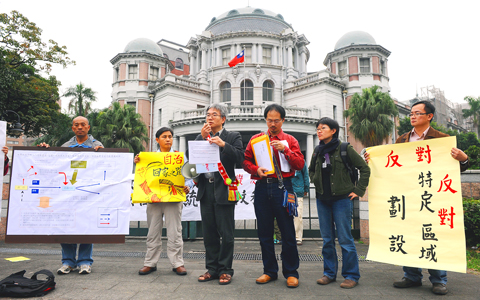Aboriginal groups yesterday filed a petition to the Control Yuan accusing the government of illegally declaring some Aboriginal areas “special zones” with bans on certain human activities.
The government earlier this month released a list of Aboriginal “special areas” that were not safe for habitation after Typhoon Morakot wreaked havoc in the south and east last August.
The designation became effective for the first three Aboriginal villages in Taitung and Pingtung Counties yesterday.

PHOTO: LO PEI-DER, TAIPEI TIMES
Aboriginal groups protested outside the Control Yuan and filed a formal complaint.
“A clause in Article 20 of the Post-Typhoon Morakot Reconstruction Special Act [莫拉克颱風災後重建特別條例] stipulates that governments — central or local — should negotiate with residents and reach a consensus before restricting residence or evacuating villages,” Hsiao Shih-huei (蕭世暉), a member of the Association for Taiwan Indigenous Peoples’ Policies, said at the demonstration.
“The same law also calls for governments to follow the Indigenous Peoples’ Basic Law [原住民族基本法] when dealing with Aboriginal domains, and [that law] requires that the government get consent from Aboriginal residents before making a decision that affects Aboriginal domains,” Hsiao said.
Hsiao said the Post-Typhoon Morakot Reconstruction Commission did not reach a consensus with Aborigines before announcing its list of “special zones.”
“Did the government act according to the Indigenous Peoples’ Basic Law? No! Was there consensus before the special zone designation? No! Did the government act according to the reconstruction act? No!” Hsiao said. “This is a serious violation of the law and an abuse of power.”
Wutu Micyang, representative of the Taiwan Alliance of Aboriginal Communities for Action, echoed Hsiao’s view.
“The government not only did not reach consensus with Aborigines, it tried to trick us when it explained to us what ‘special zones’ were. They tried to hide the negative side of the policy and told us only good things about it,” Wutu said. “They said only what compensation and assistance Aborigines can receive once their land is declared a special zone, and even said the designation won’t affect our rights at all.”
“If special zones won’t affect our rights, then why does the government want them?” Wutu questioned.
Aboriginal rights activist Omi Wilang questioned why parts of Taichung County that were not affected by Morakot had been included on the list of restricted zones and wondered whether some areas were put on the list to make way for corporations to build resorts or recreational parks.
Control Yuan member Yu Teng-fang (余騰芳), who sits on a special panel that is investigating the government’s response in the aftermath of Morakot, accepted the petition and promised to launch a probe into it.

Chinese spouse and influencer Guan Guan’s (關關) residency permit has been revoked for repeatedly posting pro-China videos that threaten national security, the National Immigration Agency confirmed today. Guan Guan has said many controversial statements in her videos posted to Douyin (抖音), including “the red flag will soon be painted all over Taiwan” and “Taiwan is an inseparable part of China,” and expressing hope for expedited reunification. The agency last year received multiple reports alleging that Guan Guan had advocated for armed reunification. After verifying the reports, the agency last month issued a notice requiring her to appear and explain her actions. Guan

GIVE AND TAKE: Blood demand continues to rise each year, while fewer young donors are available due to the nation’s falling birthrate, a doctor said Blood donors can redeem points earned from donations to obtain limited edition Formosan black bear travel mugs, the Kaohsiung Blood Center said yesterday, as it announced a goal of stocking 20,000 units of blood prior to the Lunar New Year. The last month of the lunar year is National Blood Donation Month, when local centers seek to stockpile blood for use during the Lunar New Year holiday. The blood demand in southern Taiwan — including Tainan and Kaohsiung, as well as Chiayi, Pingtung, Penghu and Taitung counties — is about 2,000 units per day, the center said. The donation campaign aims to boost

A preclearance service to facilitate entry for people traveling to select airports in Japan would be available from Thursday next week to Feb. 25 at Taiwan Taoyuan International Airport, Taoyuan International Airport Corp (TIAC) said on Tuesday. The service was first made available to Taiwanese travelers throughout the winter vacation of 2024 and during the Lunar New Year holiday. In addition to flights to the Japanese cities of Hakodate, Asahikawa, Akita, Sendai, Niigata, Okayama, Takamatsu, Kumamoto and Kagoshima, the service would be available to travelers to Kobe and Oita. The service can be accessed by passengers of 15 flight routes operated by

The Central Weather Administration (CWA) said a magnitude 4.9 earthquake that struck off the coast of eastern Taiwan yesterday was an independent event and part of a stress-adjustment process. The earthquake occurred at 4:47pm, with its epicenter at sea about 45.4km south of Yilan County Hall at a depth of 5.9km, the CWA said. The quake's intensity, which gauges the actual effects of a temblor, was highest in several townships in Yilan and neighboring Hualien County, where it measured 4 on Taiwan's seven-tier intensity scale, the CWA said. Lin Po-yu (林柏佑), a division chief at the CWA's Seismological Center, told a news conference